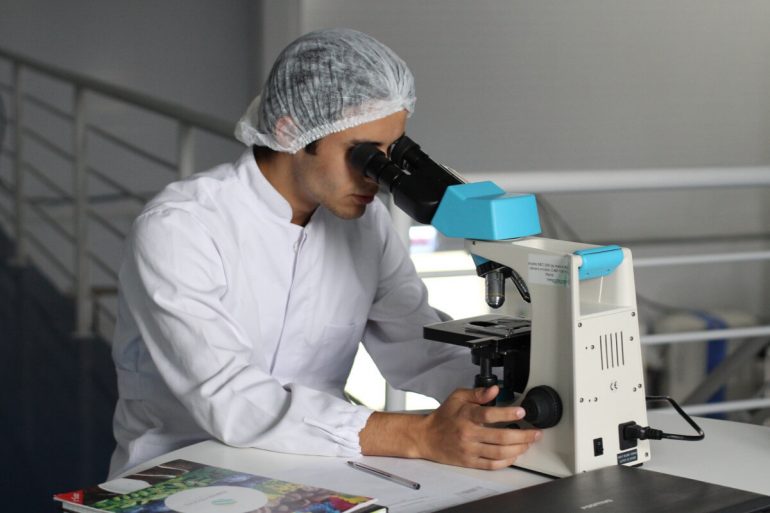As part of a regular series powered by IBM, BetaKit interviews Canadian tech leaders using innovation for the greater good.
For people around the world, it’s all-too-common to have a relative or loved one suffer from an undiagnosable illness. To Fusion Genomics co-founders Mohammed Qadir and Greg Stazyk, that all-too-common story should be a thing of the past.
Applying quantum computing and IBM Cloud to medical science, Qadir and Stazyk have built a next generation sequencing (NGS) medical testing platform that aims to diagnose all infectious diseases and their nearest mutations.
The high cost of inadequate healthtech
“We’ve had similar diagnostic methods for [over 100 years] and similar molecular diagnostics technology for the past 20 years,” Qadir said. “However, the percentage of undiagnosed individuals [remains the same]. This means that our current technology is inadequate to address the growth and mutations of infectious diseases.”
Current medical technology cannot cope with the amount of data necessary to fully analyze all possible outcomes.
Even as medical technology has made huge advances in diagnostics, the unfortunate reality is that infectious diseases mutate faster than Moore’s Law. This adds direct cost of over $25 billion in additional medical fees and strain on the system, Qadir explained. Factor in the results of antibiotic resistance from undiagnosed people taking the wrong pills, and the total cost figure hovers around $50 billion to medical systems in Canada and the United States. Globally, the problem is staggering.
Qadir added that the most commonly cited issue with currently used technology is that it’s not looking holistically at all mutation patterns, missing some vital steps in virus development, and failing when the pathogen in question mutates beyond what the technology can identify.
In a world where computing power and memory gets cheaper by the day, this seems like a simple problem. The issue, however, is that current medical technology cannot cope with the amount of data necessary to fully analyze all possible outcomes. From a foundational level, Qadir and Stazyk believe current infectious disease tech is limited.
“Our mission is to never see a crowded emergency room filled with people that doctors cannot diagnose, ever again,” Qadir said.
Quantum computing and machine learning medicine
The idea for Fusion Genomics initially came from Qadir’s work at the BC Cancer Foundation. Gene sequencing is the norm in cancer studies, which is the process of tracking a current cancer cell’s properties and mutations. Doctors take the analysis and use it to inform treatment options based on how different treatments have reacted to cancer cells in labs.
In many cases, cancer cells feature a narrower path of growth and slower progression, making them easier to sequence in full. Gene sequencing has not been a viable method for other infectious disease research because of the aforementioned technological limitations most other infectious diseases have more mutations, more properties, and less direct funding for research than cancer.
However, Qadir and Stazyk believe that narrative can be changed through Fusion Genomic’s quantum technology in conjunction with IBM Cloud and machine learning.

“Our platform is ‘benchtop to desktop’,” Stazyk explained. “Labs administer tests, which provide gene sequences. Quantum probing enriches target pathogens up to 10,000x of whole (meta) genome sequencing, while removing unwanted DNA/RNA molecules, thus making it easier to analyze their specific properties. After that, machine learning based algorithms allow the pathogen genomes to be assembled and identified, while simultaneously tracking how the disease is mutating in the larger population.”
“Information is then sent to doctors,” Stazyk continued. “We have two levels of data sharing: private, confidential information to a specific doctor about their patient’s condition, and broader, anonymized data for public health use cases. We trained our algorithms with over one million known pathogen sequences and designed our quantum probes to have the smallest ‘net’ possible, meaning they capture more data than current methods allow.”
Fusion Genomics’ system works, Qadir and Stazyk said, because of how quantum computing and machine learning interact. The system is much cheaper and more efficient than current database analysis technologies since it can simultaneously analyze hundreds of pathogen genomes at once. Current systems are a one-pathogen, one-analysis modality, explained Qadir.
“We are in a golden age of collecting data,” he added. “But in order to take advantage of this data, we had to build technology from the ground up, and throw out conventional infectious diseases diagnostic wisdom.”
Believing in Canadian innovation
To fulfill its mission statement, Fusion Genomics is building from the ground up, but also working with technology providers to share the burden.
“We make heavy use of IBM,” said Stazyk. “Not only is their research valuable for us, their platform helps us deliver our solution.”
“Our experience, especially from the Canadian VC world, is that Canadians need to have more faith in innovations based in Canada.”
Right now, Fusion Genomics is pre-commercial, conducting tests with global government partners and pharma companies. It’s been going well for them, Qadir said, and the team is getting closer to a sustainable, scalable model that can track all types of infectious disease.
However, such an ambitious goal requires a passionate community behind it, and Qadir and Stazyk worry that they may not find that community in Canada.
“Our experience, especially from the Canadian VC world, is that Canadians need to have more faith in innovations based in Canada,” Qadir stated.
“Not every throw-convention-out-the-window-and-tackle-global-problems innovation happens in the United States. Canadians are just as capable of delivering the most cutting-edge technologies and innovations in the world.”
Photo via Unsplash

